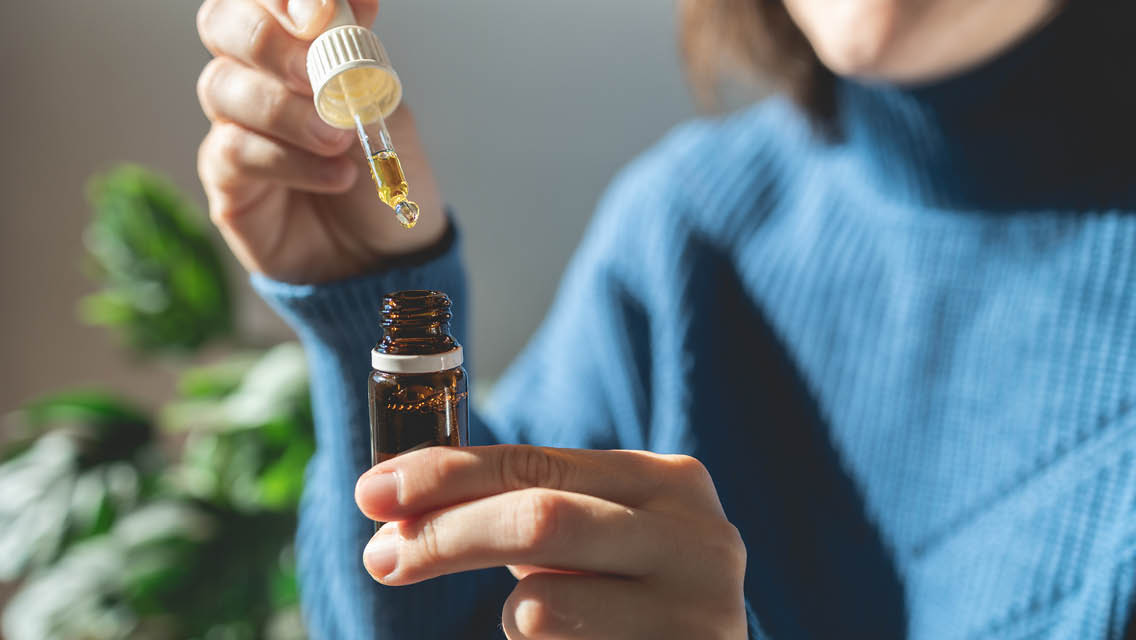Key Supplements to Support Mental Health
B Vitamins ⋅ Vitamin D ⋅ Iron ⋅ Magnesium ⋅ Omega-3 Fatty Acids. ⋅ Probiotics ⋅ Selenium ⋅ Zinc
Supplements to Support Occasional Stressors and Challenges
If you’re anything like me, your kitchen and medicine cabinets probably contain several nutritional supplements. Perhaps you stock vitamin C to treat colds, or a daily multivitamin to avoid catching them. You might have fish oil to manage inflammation or magnesium to soothe your muscles.
Still, you might not know that many nutrients are just as essential to mental health as they are to physical well-being. A growing body of research suggests that sustained mental wellness may remain out of reach when our nutritional status is compromised.
In part that’s because the brain is a hungry organ. It constitutes about 2 percent of our body weight, but it devours between 20 and 40 percent of the nutrients and calories we consume. What we eat and drink determines how well our brains function — and, by extension, how well we do.
Our nutrient status influences more than just mood. It affects how we process information, as well as how we react to and recover from stressors. Inflammation, gut health, and adrenal functioning all play a role in cognitive and emotional performance, and all are affected by nutrition.
Ideally, we would get all the nutrients we need for a healthy brain from our food, but this can be tricky. When we’re struggling with mental health issues, maintaining a healthy diet can be challenging. And while it’s no surprise that ultraprocessed foods won’t provide the micronutrients our brains crave, even those who manage to load up on fresh vegetables and whole grains may suffer deficiencies, because modern agricultural practices have depleted many essential nutrients from the soil.
Whatever its cause, a nutrient deficiency can be one reason a mental health condition doesn’t respond to other forms of treatment — and supplements may be the missing link.
“I see supplemental nutrients as a safe and gentle bridge to wellness,” says integrative psychiatrist Henry Emmons, MD, author of The Chemistry of Joy and The Chemistry of Calm.
He considers certain supplements daily essentials for mental health; others work best as a temporary support. “Supplements can elevate people to a healthy baseline so that they have the energy, motivation, and mental and emotional stability to commit to long-term lifestyle changes, including diet.”
Functional nutritionist Jesse Haas, CNS, LN, also includes supplements and herbal remedies whenever she’s addressing a client’s mental health struggles. When used in concert with other self-care practices, she says, “herbs and supplements can really accelerate the healing journey.”
Neither Haas nor Emmons suggests clients toss out their prescription drugs or cancel therapy sessions. They advocate for a both/and approach, noting that micronutrients typically complement, rather than replace, other forms of treatment. Supplements can compensate for nutrient deficiencies caused by medication use, and some may even boost the efficacy of certain medications.
Key Supplements for Mental Health
What follows is a roundup of supplements that support mental health. For the best results, Haas and Emmons both recommend doing lab testing with a healthcare provider to identify deficiencies if you can afford it.
Most of these nutrients can be screened with a blood test, with a few exceptions: A stool test is required to assess the status of the microbiome, and selenium and zinc deficiencies are detected through hair analysis. (Zinc can also be measured with blood-plasma or urine tests.)
A provider can help determine appropriate doses, especially if you’re taking pharmaceuticals. Know that we all have different requirements based on health status, genetics, and lifestyle.
B Vitamins
A B-complex supplement is “the most overlooked, inexpensive, and benign treatment there is,” write Bonnie J. Kaplan, PhD, and Julia J. Rucklidge, PhD, in The Better Brain: Overcome Anxiety, Combat Depression, and Reduce ADHD and Stress with Nutrition.
When stress is elevated, the sympathetic nervous system activates a range of protective responses, including spikes in blood sugar and adrenal hormones like cortisol. Ongoing stress leads to chronic adrenal activation, exhausting the stress-response system and often leading to low mood; Bs can help regulate this response and prevent burnout.
Bs also play a key role in the methylation cycle, which is how the body produces and sustains protein and DNA. The methylation process facilitates DNA repair, detoxification, hormone regulation, and the production of several neurotransmitters, including serotonin and dopamine. Without sufficient B vitamins, especially B9 (known as folate) or folic acid (synthetic folate), those sleep-, mood-, and energy-regulating neurotransmitters can’t do their jobs.
Some people have a polymorphism in the gene MTHFR that impedes folate processing; this often corresponds to depressive tendencies. For those who can’t convert folate into a usable form, Emmons recommends an “activated” B supplement in which folate is easier for the body to access. (Find out more about B vitamins and mental health at “All About B Vitamins.”)
How to Supplement With B Vitamins:
For general mental health support, a B-complex supplement is best; it will contain some or all of the B vitamins necessary for a good baseline. These supplements may cause upset stomach, so take them with food. Look for a complex that contains the following:
- B6: The recommended dietary allowance is between 1.3 and 1.7 milligrams (mg). (If you’re over 50, seek 1.5 mg or more.)
- B9: You want at least 400 micrograms (mcg) per day. If you’re pregnant, or if you consume more than one alcoholic drink a day (alcohol can impair absorption), aim for 600 mcg.
- B12: Take around 2.4 mcg.
Note: If you choose an activated B-complex supplement and begin to feel jittery, reduce the dose or discontinue.
Vitamin D
D is often referred to as the sunshine vitamin, as a primary source is the sun’s ultraviolet rays. This explains why vitamin D deficiency is most common in climates in the far north and far south, where sun exposure is limited in the winter months, and among individuals with darker skin, as melanin acts as a sort of natural sunscreen.
Unlike supplements that work directly on neurotransmitters, vitamin D supports mental health primarily by reducing inflammation. Researchers are beginning to understand the key role of neuroinflammation in depression and other mental-health disorders, so regulating the inflammatory response is key to defending the brain.
One study published in 2020 showed that early intervention with an activated form of vitamin D helped reduce neuroinflammation in subjects with multiple sclerosis (MS). This was an important finding, as MS, a disease of the central nervous system, often negatively affects cognitive function.
How to Supplement With Vitamin D:
The Institute for Functional Medicine recommends no less than 2,000 IUs of vitamin D per day for adults. “Vitamin D replenishment represents the single most cost-effective thing we can do in medicine to boost baseline health,” says functional-medicine practitioner Gregory Plotnikoff, MD, IFMCP.
Because we all metabolize vitamin D differently, some people will need more to achieve an optimum blood level of 50 to 80 ng/mL. Have your D levels tested to establish your baseline, and if your levels are low, test them again three to six months after you start supplementing to make sure they’ve improved. (Learn more about the importance of vitamin D at “Vitamin D: What You Need to Know.”)
Iron
If the brain is the body’s hungriest organ, iron is its maître d’. Hemoglobin, which is iron-based, transports oxygen to the brain, making this one of the most essential nutrients for supporting cognitive function.
Iron is also necessary for the production of dopamine and serotonin, which regulate mood, focus, and pleasure. And it’s a key ingredient of myelin, the insulation around our nerves that speeds conduction between neurotransmitters.
Given all these roles, low iron levels can impair emotional and behavioral functioning, and they’ve been linked to brain fog and low energy. That’s why Haas often recommends a complete blood-cell count to assess for iron deficiencies when clients are struggling with energy, focus, and mood.
How to Supplement With Iron:
Iron supplements are widely available in pill form, but it’s best to have your levels assessed by your healthcare provider before you start taking them. Generally speaking, adult men should consume 8 mg daily and women 18 mg, but our iron requirements are highly individual. They vary based on age, biological sex, and diet — a menstruating woman needs more iron than a postmenopausal one; vegetarians need nearly twice as much iron as those who consume meat, and so on.
Magnesium
This mineral is sometimes called the “calming chemical,” writes psychiatrist Drew Ramsey, MD, in his book Eat to Beat Depression and Anxiety. He notes that it was one of the first nutrients demonstrated to help treat depression.
Magnesium helps keep adrenals in check and contributes to the creation and transmission of the mood-regulating neurotransmitter serotonin. It also helps stimulate the release of soothing gamma-aminobutyric acid (GABA).
“It’s the mineral at the center of photosynthesis,” explains Ramsey. “I think about magnesium as a way to conduct the flow of energy from the sun all the way to your brain.”
Emmons frequently recommends this mineral for individuals struggling with anxiety or sleep disturbances.
How to Supplement With Magnesium:
Magnesium is found in a variety of foods, including dark chocolate and avocados. Supplements come in pill or powder form; the latter is combined with water to make a fizzy drink. Adult men need 400–420 mg daily; adult women need 310–320 mg. If your bowels become too loose, reduce your dose.
(For more on this critical nutrient, see “Magnesium: Your Body’s Spark Plug.”)
Omega-3 Fatty Acids
These anti-inflammatory fatty acids are critical to brain health throughout our lives. During pregnancy, omega-3s help foster fetal brain development, contributing to neurotransmitter signaling and the growth of nervous tissue. In adults, omega-3 deficiencies are linked to a range of mental health issues, including depression, ADHD, dementia, bipolar disorder, and schizophrenia.
These fatty acids are found in foods such as cold-water fish, flaxseeds, and walnuts, but it can be hard to reach optimum levels unless you’re eating fatty fish (such as salmon or sardines) at least twice a week.
Accordingly, Emmons believes most of us benefit from supplements that contain several fatty acids from the omega-3 family: alpha-linolenic acid, docosahexaenoic acid (DHA), and eicosapentaenoic acid (EPA). Of these, DHA and EPA are the most easily metabolized forms of omega-3.
How to Supplement With Omega-3 Fatty Acids:
Seek out a quality fish-oil formula with high concentrations of EPA and DHA (for vegetarians, algal oil is a good option). Adult men need around 1.6 grams of omega-3 daily; adult women need about 1.1 grams.
(For a guide to understanding omega-3 and omega-6 fatty acids and how they influence your health see “The Omega Balance.”)
Probiotics
“Gut feeling” isn’t merely a turn of phrase. The GI tract houses millions of neurons that transmit messages from the nervous system, signaling messages like I’m hungry, This doesn’t feel right, and more.
Additionally, our guts produce several of the neurotransmitters that contribute to mood and emotional regulation, including dopamine and serotonin. In fact, the vast majority of feel-good serotonin is produced in the gut — not the brain.
Probiotic foods like yogurt and sauerkraut and probiotic supplements support the good bacteria in the GI tract, acting as fertilizer for your microbiome. This helps keep the microbiota happy and healthy, which keeps the brain and nervous system happy and healthy, too.
One meta-analysis of 10 clinical trials reported that probiotics helped improve mood in people with mild to moderate depressive symptoms, while another linked probiotic supplementation to a substantial reduction in depression for people under 60. (Learn more about the gut–brain connection at “Healthy Gut, Healthy Brain.“)
How to Supplement With Probiotics:
In addition to upping your consumption of probiotic foods (fermented vegetables, tempeh, and yogurt) and drinks (kefir and kombucha), you can take probiotic capsules. Recommended doses range between 1 billion and 10 billion colony-forming units (CFUs) per day.
(For more guidance on finding a good probiotic supplement, see “Everything You Need to Know About Probiotics.”)
Selenium
We only need trace amounts of selenium, but it’s a key player in mental health. It helps regulate metabolism, and DNA synthesis and neurotransmission, and it’s a component of potent antioxidants. “Antioxidants help protect cells, including brain cells, from damaging, inflammatory molecules called free radicals,” explains Ramsey. “In order to make those antioxidants, however, the body needs the appropriate ingredients. Selenium is one of these.”
Mothers-to-be who increase their selenium intake before giving birth are less likely to develop postpartum depression, and selenium can also reduce depressive symptoms among those who do develop the disorder.
One meta-analysis published in 2022 found that supplementation “significantly reduced depressive symptoms” in subjects with depression, even as researchers couldn’t fully account for the effect. One explanation might be selenium’s ability to help regulate inflammation, as increasing evidence points to chronic inflammation as a factor in mental illness.
How to Supplement With Selenium:
Selenium supplements are typically available in capsule form. Adult men and women need around 55 mcg daily. Pregnant and lactating women require 60 and 70 mcg daily, respectively.
Zinc
The antidepressant properties of zinc are well known and well supported by research. The mineral may influence our levels of brain-derived neurotropic factor (BDNF), which supports the growth and survival of our neurons. This production of neurons is central to neuroplasticity, which helps the brain adapt in times of change or crisis. If we lack adequate zinc to support good BDNF levels, we’re at greater risk of developing depression.
For those using selective serotonin reuptake inhibitors (SSRI), zinc appears to work well as an adjunct. The serotonin-enhancing effects of SSRIs may amplify zinc’s therapeutic effects.
How to Supplement With Zinc:
Oysters and red meat offer zinc in abundance. Supplements come in pill form. Women need about 8 mg per day, while men should aim for 11 mg; it’s best taken with food to avoid nausea.
Note: Excess zinc may interfere with the absorption of other minerals. Before supplementing, work with your healthcare provider to assess your baseline and determine an appropriate dose.
(Learn more about this building block for healthy cells, how to tell if you’re deficient — and what you can do to optimize your zinc levels with good nutrition — at “The Health Benefits of Zinc.“)
On-the-Spot Mental Health Support
Occasional stressors like sleeplessness or brain fog can make it tempting to reach for over-the-counter drugs, but some mental health experts recommend trying nutritional supplements and remedies first. Here are a few common challenges and some remedies that can help.
Anxiety
For chronic anxiety, it’s key to boost baseline brain health with the supplements addressed throughout this article. But in times of acute stress, certain remedies can offer additional relief. “For situational stress, I look to remedies that tamp down stress hormones and support the adrenals,” says Emmons.
Here are some good options:
⋅ Kava root contains kavalactones, compounds that influence a range of neurobiological activities related to anxiety, including modulating GABA receptors.
⋅ Ashwagandha is an adaptogenic herb that can reduce cortisol levels and improve sleep.
⋅ L-theanine is an amino acid that can settle some physiological responses to stress, such as elevated heart rate. (For more herbal anxiety remedies, see “What Are the 5 Best Herbs for Anxiety?“.)
Brain Fog
A quality diet and stable blood sugar are keys to maintaining a clear head. Notably, dark chocolate contributes to both, according to psychiatrist Drew Ramsey, MD. He contends that the flavanols it contains may help combat brain fog.
But when the fog persists, there are supplements that can help.
Functional nutritionist Jesse Haas, CNS, LN, recommends these herbs to combat brain fog:
⋅ Tulsi (a.k.a. holy basil) has been shown to improve mood and cognitive functioning, including memory.
⋅ Rhodiola can help enhance memory, learning, and cognitive performance.
⋅ Curcumin and Bacopa monnieri have been linked to improved memory and attention in the aging brain.
Insomnia
Even one night of poor sleep can disrupt mood and demolish focus. When sleeplessness becomes chronic, mental well-being can suffer significantly. That’s why integrative psychiatrist Henry Emmons, MD, believes that prioritizing sleep is the best way to promote optimal mental health.
“When sleep falls into place, depression and anxiety can sometimes improve on their own, and natural remedies are much gentler and safer than prescription sleep aids.”
Emmons considers magnesium the most crucial micronutrient for treating sleep issues, but he also suggests these herbal remedies:
⋅ Valerian root interacts with GABA and serotonin receptors to calm nerves and improve sleep; it’s especially good for those who suffer from anxiety or hyperactivity.
⋅ Passionflower can increase the time we spend in restorative slow-wave sleep, leading to fewer disturbances and better-quality rest overall.
⋅ CBD stands for cannabidiol, a chemical found in hemp plants. CBD calms the nervous system, and studies suggest it may improve the overall quality of sleep. (Learn more about how CBD works at “Is CBD Effective?“)
Fatigue
To treat general sluggishness, Haas focuses on stabilizing blood sugar by reducing caffeine and sugar. Ramsey encourages clients to go gluten-free: He says gluten isn’t a root cause of depression for most people, but that people with gluten and other food sensitivities may experience fatigue, headaches, joint aches, and mood changes when they eat those foods.
Emmons maintains that nutrient status must be part of the equation when addressing low energy. “I always think in terms of systems,” he explains.
Emmons suggests these supplements to help fatigue:
⋅ Coenzyme Q10 supports energy production at the cellular level, in part by supporting mitochondria. Individuals with chronic fatigue syndrome typically have low levels of CoQ10, but supplementing can benefit energy levels for everyone.
⋅ Lithium orotate is a milder version of prescription lithium (which is lithium carbonate). Emmons suggests that it can be a good choice if fatigue is accompanied by a low mood. (For more on this, see “Can Lithium Orotate Be Used for Everyday Mood Support?“)
(For more about supporting your mental health with nutrition, “How Diet Can Make — or Break — Your Mental Health.”
This article originally appeared as “Your Natural Mental Health Kit ” in the May 2023 issue of Experience Life.






This Post Has 3 Comments
For sleep, shouldn’t your be recommending CBN instead of CBD?
Hey, as a fellow clinician, I am extremely concerned about this article. While for most people these supplements would be fine, for many who are on SSRI or SNRI medications along with other psychotropic meds, some of these “natural” supplements can and ARE harmful. It should also be noted that supplements are not regulated at all, so often times the amount of vitamins and minerals the bottle claims to have, is not the case at all. Just look at the very recent recall of all the children’s melatonin products. As ALWAYS, please speak to your medical doctor before supplementing with anything.
I had no clue that we all have varied needs based on our health state, genetics, and lifestyles. As you said, a provider can help you identify the proper amounts, especially if you’re taking drugs. I am actually looking this up because I’ve been dealing with anxiety, and I’m considering professional-grade supplements as part of my self-care routine to help manage it. It’s a proactive step I want to take to promote my mental well-being alongside other strategies like exercise and mindfulness.